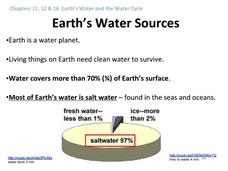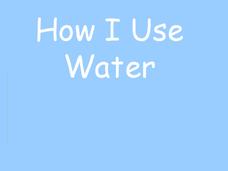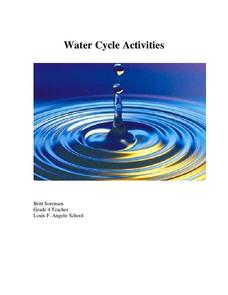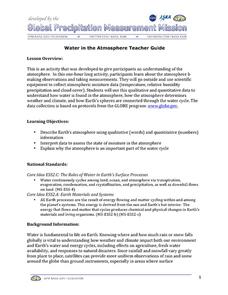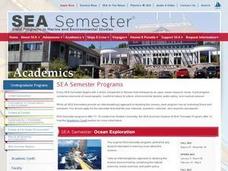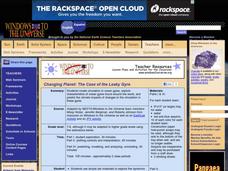Curated OER
Earth's Water Sources
General facts about Earth's water sources, human use, and the water cycle are outlined by this presentation. Slide three has a grammatical error and slide nine refers to the local watershed of the author, so you will need to make a few...
Texas State Energy Conservation Office
Global Climate Change
Here is an extensive reading resource that addresses our climate change crisis. It thoroughly explains the greenhouse effect, related Earth cycles, and the history of climate change. Use it as part of the intended unit, published by the...
Curated OER
Who Owns Water
Learners role play how water is allocated to different holders of water rights. For this ecology lesson, students identify the different water rights available. They explore problems associated with water use including drought, degraded...
PHET
Energy Forms and Changes
Is the ice cooling down the water or is the water melting the ice? Here is a simulation that explores thermal energy transfer with iron, brick, and water. It demonstrates the flow of energy and what happens when each material is either...
Curated OER
The Water We Drink
Third graders relate that the quality of their drinking water is subject to the condition of the environment and water found in streams and creeks in their community. They track the travel of a wad of paper from a student's desk to a...
National Weather Service
The Water Cycle
Looking for a full-color, labeled water cycle diagram? You found one! From evaporation to precipitation to plant uptake and everything in between, it's all here and beautifully illustrated.
Curated OER
How I Use Water
Beginning with a brief anticipatory set on how water is commonly used, this presentation evolves into a well planned lesson on the water cycle. Students will discuss vocabulary, label the parts of the water cycle, locate where water is...
Curated OER
Water in the Biosphere
Environmental explorers examine the campus and take note of living organisms. Introduce them to the biosphere and the questions of the day: How much water can be found in the biosphere? A slide show helps you along, and even contains a...
Curated OER
Looking at the Water Cycle
In this Looking at the Water Cycle worksheet, read an explanation of the water cycle and fill in missing words. Students also create a poster about the water cycle, deliver a weather forecast, and research further questions.
Curated OER
Water Cycle Activities
Explore the water cycle in all aspects with a resource packed full of activities and lessons. The 37-page packet comes with vocabulary, a game, writing prompts, printables, and opportunities to journey through the stages in the water...
Curated OER
Water in the Atmosphere
A slide show serves as the backdrop for a lesson on the moisture in Earth's atmosphere. Through it, mini meteorologists learn about the attributes of the atmosphere and actually use data-collecting weather tools to make observations and...
NOAA
Water Cycle
Be water wise! Science scholars learn the water cycle on a global scale in part seven of a 13-installment series. The hands-on interactive allows them to explore Earth's water storage, types of precipitation, and the cycling of water...
It's About Time
Chemistry and Physical Changes
Engage the class like never before as pupils learn to differentiate between multiple physical and chemical changes by conducting a list of small experiments, most often with household materials. They make observations and discuss the...
American Chemical Society
Changing State: Evaporation
Why do experiments require a control? Guide scholars through designing an experiment to see what they can do to evaporate water faster with a lesson plan that stresses the importance of controlling all variables. The second activity...
National Wildlife Federation
Quantifying Land Changes Over Time in Areas of Deforestation and Urbanization
Is qualitative or quantitative research more convincing when it comes to climate change? In the eighth lesson during this 21-part series, scholars begin by performing a quantitative analysis of deforestation and urbanization. Then, they...
Pennsylvania State University
Learn, Protect, and Promote Water
A hands-on activity helps learners explore the water cycle. After discussing how they use water, classes discuss water pollution and then move into a simulation where 20 pupils move through the water cycle based on description cards.
Curated OER
Waters of the Earth
Students make a striking visual display showing the distribution of water on earth.
Curated OER
Dance: Water Dancing
Examine the way water moves, drips, and splashes with an expressive dance. Learners discuss the ways in which water moves, then create dance sequences that show or describe water. There are several suggestions to adapt this lesson plan...
Curated OER
Water Cycle Reading and Writing
Here is a great way to get pupils to express a scientific concept in a fun way. After hearing the story of Walter the Water drop and learning facts about the water cycle, the class will write a creative expository piece describing what...
University of Waikato
Water Runoff
Teachers demonstrate water runoff on a hill and its effect on soil erosion. Pupils observe as the instructor changes the steepness of the hill and see whether vegetation covers the soil. Learners then use their observations to make...
Kenan Fellows
How Much Heat Can a Phase Change Produce?
Scholars learn about heat release in phase changes. They perform calculations as they compare and contrast a science fiction passage and a home heating application.
Longwood University
How Can We Help Maintain Our Water Supply? Conserving Water
Make young citizens aware of their environmental impact early. An inquiry-based lesson helps learners analyze their own water usage patterns and understand the effects of their habits. Individuals look at data to spot trends and see how...
Curated OER
Changing Planet: Withering Plants - Stressing Over Lost Water
Expectant earth scientists examine the bottom side of a leaf and learn the role of the stomata. They consider the gas exchange that occurs through these structures and relate how the climate is changing to its impact on food crops. This...
Curated OER
Changing Planet: The Case of the Leaky Gyre
The fascinating video "Changing Planet: Fresh Water in the Arctic," introduces your oceanographers to the world's gyres. They learn that melting sea ice is making the gyres larger, and that the changes could, in turn, contribute even...


